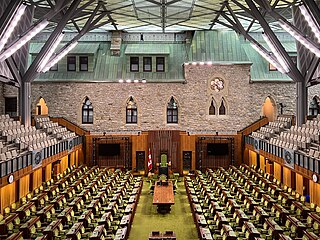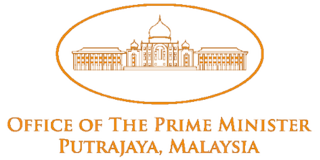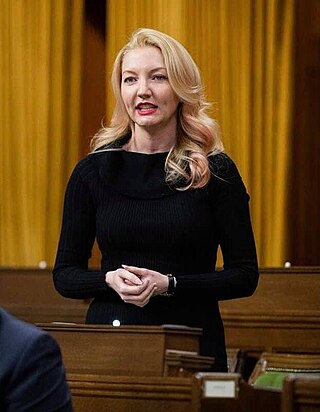
The House of Commons of Canada is the lower house of the Parliament of Canada. Together with the Crown and the Senate of Canada, they comprise the bicameral legislature of Canada.

Paul Edgar Philippe Martin, also known as Paul Martin Jr., is a Canadian lawyer and politician who served as the 21st prime minister of Canada and the leader of the Liberal Party of Canada from 2003 to 2006.
Loss of supply occurs where a government in a parliamentary democracy using the Westminster System or a system derived from it is denied a supply of treasury or exchequer funds, by whichever house or houses of parliament or head of state is constitutionally entitled to grant and deny supply. A defeat on a budgetary vote is one way by which supply can be denied. Loss of supply is typically interpreted as indicating a loss of confidence in the government. Not all "money bills" are necessarily supply bills. For instance, in Australia, supply bills are defined as "bills which are required by the Government to carry on its day-to-day business".

The prime ministerof Malaysia is the head of government of Malaysia. The prime minister directs the executive branch of the federal government. The Yang di-Pertuan Agong appoints the prime minister as a member of Parliament (MP) who, in his opinion, is most likely to command the confidence of a majority of MPs. The Prime Minister is usually the leader of the party winning the most seats in a general election.

The Parliament of Malaysia is the national legislature of Malaysia, based on the Westminster system. The bicameral parliament consists of the Dewan Rakyat and the Dewan Negara. The Yang di-Pertuan Agong (King), as the head of state, is the third component of Parliament.

The treasurerof Australia, also known as the Federaltreasurer or simply the treasurer, is the minister of state of the Commonwealth of Australia charged with overseeing government revenue collection, federal expenditure and economic policy as the head of the Department of the Treasury. The current treasurer is Jim Chalmers, who was selected by Prime Minister Anthony Albanese in May 2022 following the 2022 Australian federal election.
The 2005 Canadian federal budget was the budget of the Government of Canada for the 2005–2006 fiscal year. It was presented on February 23, 2005, by Finance Minister Ralph Goodale. It was the first Canadian federal budget presented by a minority government since the budget of the Joe Clark Progressive Conservative government in 1979, which was defeated by the opposition parties.
An Australian federal budget is a document that sets out the estimated revenues and expenditures of the Australian Treasury in the following financial year, proposed conduct of Australian government operations in that period, and its fiscal policy for the forward years. Budgets are called by the year in which they are presented to Parliament and relate to a financial year that commences on the following 1 July and ends on 30 June of the following year, so that the 2023 budget brought down in May 2023 relates to the 2023/24 financial year.

The Canadian federal budget for the fiscal year 2006–2007, was presented to the House of Commons of Canada by Finance Minister Jim Flaherty on May 2, 2006. Among the most notable elements of the federal budget were its reduction of the Goods and Services Tax by one percentage point, income tax cuts for middle-income earners, and $1,200-per-child childcare payment for Canadian parents.

The 2008–2009 Canadian parliamentary dispute, during the 40th Canadian Parliament, was triggered by the expressed intention of the opposition parties to defeat the Conservative minority government on a motion of non-confidence six weeks after the federal election of October 14, 2008.
Kevin Page is a Canadian economist. He was the first Parliamentary Budget Officer for Canada. He was appointed to the position on March 25, 2008, and his term was completed on March 22, 2013. He now teaches at the University of Ottawa. In 2013, Page was named as the Jean-Luc Pepin Research Chair on Canadian Government. In 2016, Page became the head of the newly created Institute of Fiscal Studies and Democracy (IFSD), a think tank with a focus on public finance and policy at the University of Ottawa.

The Office of the Parliamentary Budget Officer is an office of the Parliament of Canada which provides independent, authoritative and non-partisan financial and economic analysis. The office is led by the Parliamentary Budget Officer, an independent officer who supports parliamentarians in carrying out their constitutional roles of scrutinizing the raising and spending of public monies and generally overseeing the government's activities.

The Budget of His Majesty's Government is an annual budget set by HM Treasury for the following financial year, with the revenues to be gathered by HM Revenue and Customs and the expenditures of the public sector, in compliance with government policy. The budget statement is one of two statements made by the Chancellor of the Exchequer in the House of Commons, with the Spring Statement being made the following year.

The 1993 Canadian budget was a Canadian federal budget for the Government of Canada presented by Minister of Finance Don Mazankowski in the House of Commons of Canada on 26 April 1993. It was the fifth budget after the 1988 Canadian federal election and would be the last before the 1993 Canadian federal election.
The New Zealand Budget is an annual statement by the New Zealand Government that outlines of the nation's revenues and expenditures for the preceding fiscal year and expectations for the next one. It is prepared by the New Zealand Treasury for the Minister of Finance. The Budget is usually presented to the House of Representatives in May.

Jennifer O'Connell is a Canadian Liberal politician, who was elected to represent the riding of Pickering—Uxbridge in the House of Commons of Canada in the 2015 federal election.
In Malaysia, federal budgets are presented annually by the Government of Malaysia to identify proposed government revenues and spending and forecast economic conditions for the upcoming year, and its fiscal policy for the forward years. The federal budget includes the government's estimates of revenue and spending and may outline new policy initiatives. Federal budgets are usually released in October, before the start of the fiscal year. All of the Malaysian states also present budgets. Since state finances are dependent on money from the federal government, these budgets are usually released after the federal one.
The Canadian federal budget for the fiscal years of 2020–21 and 2021–22 was presented to the House of Commons by finance minister Chrystia Freeland on 19 April 2021. The Canadian government did not produce a budget in 2020 due to the COVID-19 pandemic. Instead, the government produced a series of economic updates and stimulus plans throughout the year.
The Canadian federal budget for fiscal year 1997-1998 was presented by Minister of Finance Paul Martin in the House of Commons of Canada on 18 February 1997. It is the last budget of the 35th Canadian Parliament and the last budget before the 1997 Canadian federal election. The budget's unofficial subtitle is Building the Future for Canadians.

The Canadian federal budget for the fiscal years of 2022–23 was presented to the House of Commons by Finance Minister Chrystia Freeland on 7 April 2022.











